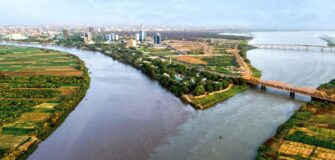Floods in Nigeria Claim Lives and Devastate Farmland, Worsening Food Insecurity
Share
Nigeria is grappling with severe flooding that has claimed the lives of scores of people and caused widespread destruction across the country. The floods, which have affected multiple states, have not only taken a human toll but have also washed away vast areas of farmland, raising concerns about escalating food insecurity in the region.
The Impact of the Floods
Heavy rains have led to rivers overflowing their banks, submerging homes, schools, and infrastructure in several communities. The Nigerian government has reported that the floods have displaced thousands of people, forcing them into temporary shelters with limited access to basic necessities.
In addition to the tragic loss of life, the floods have wreaked havoc on Nigeria’s agricultural sector. Large swathes of farmland have been inundated, destroying crops that were nearing harvest. This destruction is expected to exacerbate the already critical levels of food insecurity in the country, where millions of people depend on subsistence farming for their livelihoods.
Rising Food Insecurity
The loss of farmland due to the floods is a major blow to Nigeria’s food supply. With the agricultural sector struggling to recover from the impact of previous floods and other climate-related challenges, the country is now facing the prospect of even higher food prices and increased hunger. The floods have also disrupted supply chains, making it difficult to transport food and other essential goods to affected areas.
The situation is particularly dire in rural communities, where the majority of the population relies on farming as their primary source of income. The destruction of crops and the loss of livestock due to the floods will likely push more families into poverty and deepen the existing food crisis.
Government and Humanitarian Response
The Nigerian government, along with international humanitarian organizations, is mobilizing resources to provide emergency relief to those affected by the floods. Efforts are underway to deliver food, clean water, and medical supplies to displaced families. However, the scale of the disaster has stretched resources thin, and there are growing calls for more international support to address the crisis.
In the long term, there is an urgent need for improved flood management and disaster preparedness strategies to mitigate the impact of such events. Experts are also emphasizing the importance of investing in climate-resilient agricultural practices to help farmers adapt to the changing climate and reduce the risk of future food insecurity.
Conclusion
As Nigeria contends with the devastating impact of these floods, the situation serves as a stark reminder of the vulnerability of communities to climate change and the urgent need for comprehensive measures to protect lives and livelihoods. The floods have not only highlighted the immediate humanitarian needs but also underscored the importance of long-term solutions to ensure food security in the face of increasingly unpredictable weather patterns.
Image source:halifax.citynews.ca










